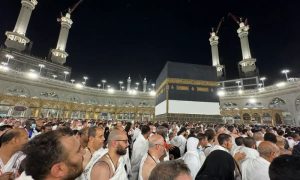IMPORTANT FACTS YOU NEED TO KNOW ABOUT HAJJ

Hajj is one of the five pillars of Islam and an obligatory pilgrimage for every financially and physically capable Muslim. Each year, millions of Muslims from across the world embark on this spiritual journey to Mecca, seeking Allah’s mercy and blessings.
An accepted Hajj is rewarded with Jannah (Paradise), making it one of the most cherished acts of worship in Islam. But have you ever wondered where the rituals of Hajj originate?
The history of Hajj dates back to the time of Prophet Ibrahim (AS), whose devotion and sacrifices laid the foundation for this sacred pilgrimage. Later, Prophet Muhammad ﷺ reinstated and completed the rituals as we observe them today.
This article delves into the historical background, significance, and spiritual benefits of Hajj, helping you understand why it remains one of the most profound experiences in a Muslim’s life.
What is Hajj?
Hajj is the annual Islamic pilgrimage to Mecca, held in the month of Dhul Hijjah. The word “Hajj” means “to intend” or “to set out for a definite purpose.”
The pilgrimage consists of a series of sacred acts, including:
-
Making Niyyah (intention)
-
Wearing Ihram (special garments for purity and unity)
-
Spending nights in Mina
-
Performing Tawaf (circumambulating the Kaaba)
-
Walking between the hills of Safa and Marwa
-
Standing at Arafah in deep prayer
-
Performing symbolic stoning of the devil (Ramy al-Jamarat)
-
Sacrificing an animal in remembrance of Ibrahim’s sacrifice
These rituals symbolize submission to Allah and commemorate the trials faced by Prophet Ibrahim (AS) and his family.
When is Hajj 2025?
Hajj takes place in the Islamic month of Dhul Hijjah, the last month of the Hijri calendar. The pilgrimage spans five days, from the 8th to the 13th of Dhul Hijjah.
Since the Islamic calendar follows the lunar cycle, the corresponding Gregorian dates for Hajj 2025 may vary.
Why is Hajj Important?
1. Hajj is a Command from Allah
Hajj is not just an option—it is a divine obligation for Muslims who have the means to undertake it. Allah (SWT) states in the Quran:
“And [due] to Allah from the people is a pilgrimage to the House—for whoever is able to find a way. But whoever disbelieves—then indeed, Allah is free from need of the worlds.”
[Surah Aal-e-Imran 3:97]
This verse makes it clear that Hajj is a mandatory act of worship, and neglecting it without a valid reason is a serious matter in Islam.
2. Hajj is One of the Five Pillars of Islam
Hajj is a fundamental pillar of Islam, standing alongside faith (Shahadah), prayer (Salah), charity (Zakat), and fasting (Sawm).
The Prophet Muhammad ﷺ said:
“Islam is built upon five: the testimony that there is no deity worthy of worship except Allah and that Muhammad is the Messenger of Allah, establishing prayer, giving Zakat, pilgrimage to the House (Kaaba), and fasting in Ramadan.”
[Sahih Bukhari, Sahih Muslim]
This hadith reinforces the idea that performing Hajj is a core part of a Muslim’s faith, to be fulfilled at least once in a lifetime.
3. Hajj Teaches Sacrifice and Submission
The story of Hajj is deeply connected to the ultimate sacrifice of Prophet Ibrahim (AS). When Allah commanded him to sacrifice his beloved son, Ismail (AS), he obeyed without hesitation. But at the last moment, Allah replaced Ismail with a ram, showing that true devotion lies in complete submission to His will.
Hajj reminds us of this great act of obedience and trust, encouraging us to surrender our desires, ego, and material attachments for the sake of Allah.
4. Hajj is a Path to Forgiveness and Spiritual Renewal
Hajj is not just about rituals—it is an opportunity for spiritual purification. The Prophet ﷺ said:
“Whoever performs Hajj and does not engage in obscenity or misconduct will return home as pure as the day his mother gave birth to him.”
[Sahih Bukhari]
This hadith highlights that a sincere Hajj wipes away all previous sins, offering a fresh start and strengthening one’s connection with Allah.
5. Hajj is a Reminder of the Hereafter
The experience of Hajj reflects the journey to the afterlife.
-
The white Ihram clothing symbolizes the shroud Muslims will wear in their graves.
-
The gathering at Arafah resembles the Day of Judgment, where all will stand before Allah.
-
The unity of millions from different backgrounds highlights that, in the end, wealth, status, and nationality hold no value—only faith does.
Hajj humbles the soul, reminding believers that this world is temporary and that preparation for the Hereafter is what truly matters.
6. Hajj Unites the Muslim Ummah
One of the most beautiful aspects of Hajj is its display of global Muslim unity.
Every year, millions of Muslims from diverse cultures, races, and backgrounds gather in Mecca as one—all dressed in simple white garments, chanting:
“Labbayk Allahumma Labbayk!” (Here I am, O Allah, at Your service!)
Hajj teaches equality, humility, and brotherhood, reminding us that Islam transcends all worldly divisions.
Conclusion
Hajj is more than just a pilgrimage—it is a spiritual journey of faith, obedience, and renewal. It symbolizes:
-
Complete submission to Allah’s will
-
A powerful reminder of sacrifice and devotion
-
A path to forgiveness and spiritual rebirth
-
A connection to the history of Prophet Ibrahim (AS) and Prophet Muhammad ﷺ
-
A beautiful display of unity among Muslims worldwide
For those who are blessed with the opportunity, performing Hajj is one of the greatest honors and rewards in Islam. May Allah grant every Muslim the chance to experience this sacred journey—Ameen!
Would you like to start preparing for your Hajj journey? 3SixtyIslam is a one-stop home for everything Islamic, including Hajj and Umrah travel services.
When planning your next Hajj or Umrah, 3SixtyIslam is your trusted agent for a convenient and affordable pilgrimage.
Begin today by strengthening your faith, increasing your knowledge, and making du’a for Allah’s invitation to His Holy House!

